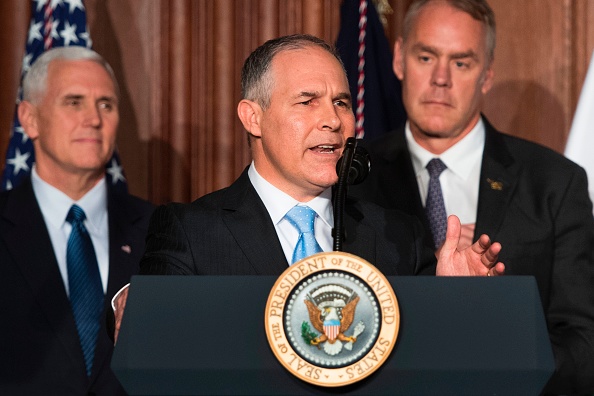Obama's EPA wanted to ban this dangerous pesticide. Trump's EPA is embracing it.


A free daily email with the biggest news stories of the day – and the best features from TheWeek.com
You are now subscribed
Your newsletter sign-up was successful
Despite the fact that chlorpyrifos have been banned from consumer products and residential use in the United States for more than 15 years and multiple studies have suggested the chemicals can have a negative impact on cognitive development in children, the Environmental Protection Agency's new head, Scott Pruitt, signed an order on Wednesday that will let farmers continue to spray the pesticide on several crops, including wheat, apples, citrus, and corn.
The Obama administration recommended banning chlorpyrifos, an organophosphate originally developed to serve as a nerve agent weapon, and the Pesticide Action Network and Natural Resources Defense Council both petitioned the EPA in 2007 to ban the chemical; Pruitt denied the petition Wednesday, and said he made his decision based on "sound science." "The new administration's agency ignored their own findings that all exposures to chlorpyrifos on foods, in drinking water, and from pesticide drift into schools, homes, and playgrounds are unsafe," Kristin Schafer, policy director at Pesticide Action Network, said in a statement.
Every year in the United States, 5-10 million pounds of the chemical are sprayed on crops. Chlorpyrifos is manufactured by DowAgroSciences, which in January objected to the ban. In California, its use has been severely restricted, and it can't be sprayed near schools and other locations when winds are clocking in at 10 mph or more, the Los Angeles Times reports. A U.C. Berkeley study of 7-year-old children living in California's Salinas Valley who were exposed to high levels of chlorpyrifos in utero found that they had slightly lower IQ scores than their peers; Columbia University researchers discovered similar findings during their own study.
The Week
Escape your echo chamber. Get the facts behind the news, plus analysis from multiple perspectives.

Sign up for The Week's Free Newsletters
From our morning news briefing to a weekly Good News Newsletter, get the best of The Week delivered directly to your inbox.
From our morning news briefing to a weekly Good News Newsletter, get the best of The Week delivered directly to your inbox.
A free daily email with the biggest news stories of the day – and the best features from TheWeek.com
Catherine Garcia has worked as a senior writer at The Week since 2014. Her writing and reporting have appeared in Entertainment Weekly, The New York Times, Wirecutter, NBC News and "The Book of Jezebel," among others. She's a graduate of the University of Redlands and the Columbia University Graduate School of Journalism.
-
 Local elections 2026: where are they and who is expected to win?
Local elections 2026: where are they and who is expected to win?The Explainer Labour is braced for heavy losses and U-turn on postponing some council elections hasn’t helped the party’s prospects
-
 6 of the world’s most accessible destinations
6 of the world’s most accessible destinationsThe Week Recommends Experience all of Berlin, Singapore and Sydney
-
 How the FCC’s ‘equal time’ rule works
How the FCC’s ‘equal time’ rule worksIn the Spotlight The law is at the heart of the Colbert-CBS conflict
-
 Witkoff and Kushner tackle Ukraine, Iran in Geneva
Witkoff and Kushner tackle Ukraine, Iran in GenevaSpeed Read Steve Witkoff and Jared Kushner held negotiations aimed at securing a nuclear deal with Iran and an end to Russia’s war in Ukraine
-
 Pentagon spokesperson forced out as DHS’s resigns
Pentagon spokesperson forced out as DHS’s resignsSpeed Read Senior military adviser Col. David Butler was fired by Pete Hegseth and Homeland Security spokesperson Tricia McLaughlin is resigning
-
 Judge orders Washington slavery exhibit restored
Judge orders Washington slavery exhibit restoredSpeed Read The Trump administration took down displays about slavery at the President’s House Site in Philadelphia
-
 Hyatt chair joins growing list of Epstein files losers
Hyatt chair joins growing list of Epstein files losersSpeed Read Thomas Pritzker stepped down as executive chair of the Hyatt Hotels Corporation over his ties with Jeffrey Epstein and Ghislaine Maxwell
-
 Judge blocks Hegseth from punishing Kelly over video
Judge blocks Hegseth from punishing Kelly over videoSpeed Read Defense Secretary Pete Hegseth pushed for the senator to be demoted over a video in which he reminds military officials they should refuse illegal orders
-
 Trump’s EPA kills legal basis for federal climate policy
Trump’s EPA kills legal basis for federal climate policySpeed Read The government’s authority to regulate several planet-warming pollutants has been repealed
-
 House votes to end Trump’s Canada tariffs
House votes to end Trump’s Canada tariffsSpeed Read Six Republicans joined with Democrats to repeal the president’s tariffs
-
 Bondi, Democrats clash over Epstein in hearing
Bondi, Democrats clash over Epstein in hearingSpeed Read Attorney General Pam Bondi ignored survivors of convicted sex offender Jeffrey Epstein and demanded that Democrats apologize to Trump
